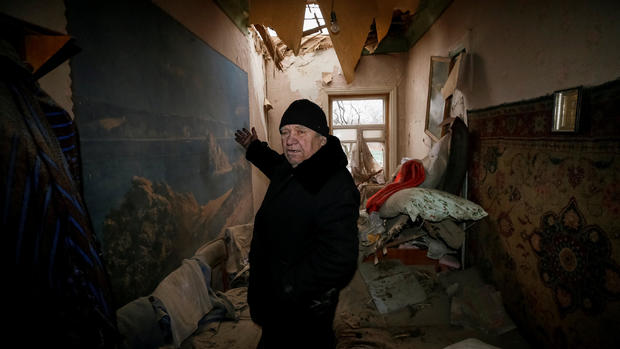Both sides in Ukraine conflict start artillery pullback
KIEV, Ukraine -- Warring parties in Ukraine took a major stride toward quelling unrest in the country's east Thursday with the declared start of a supervised withdrawal of heavy weapons from the front line.
Ukrainian and separatist officials have noted a sharp decline in violence, although the chances of a long-lasting settlement remain clouded by lingering suspicions.
While announcing the pullback, Ukraine's Defense Ministry warned that it would revise arms withdrawal plans in the event of any attacks.
"Ukrainian troops are in a state of total readiness to defend the country," it said in a statement.
The pullback was supposed to have started over a week ago under a peace deal agreed upon earlier this month to end the fighting in eastern Ukraine that has killed nearly 5,800 people since April. The intensity of fighting has declined notably in recent days, despite daily charges by both sides that the other is violating the Feb. 15 cease-fire.
Rebels in the Donetsk and Luhansk regions insist they have spent the last few days drawing back their heavy weapons -- a claim not yet verified by independent observers. Donetsk separatist leader Alexander Zakharchenko mirrored Ukrainian willingness to immediately resort to combat if provoked.
"Military equipment will be returned to their positions. Any attacks on our cities and villages will be nipped in the bud," he said.
The press office for Ukrainian military operations in the east said in a statement that government forces on Thursday started moving 100 mm anti-tank guns back the 25-kilometer (16-mile) minimum stipulated by the peace deal. AP journalists in the southeastern government-held port city of Mariupol on Thursday saw weapons matching that description heading away from the front.
Near Olenivka, a town south of the rebel-held stronghold of Donetsk, AP journalists saw rebel forces moving at least six 120 mm self-propelled howitzers from the front line.
The Organization for Security and Cooperation in Europe, which has hundreds of monitors in the region, has not yet reported on the progress of the withdrawal.
In Rome, NATO Secretary General Jens Stoltenberg said he welcomed indications of reduced fighting, but repeated claims that Russia has supplied separatists with large quantities of weapons.
"Russia has transferred in recent months over 1,000 pieces of equipment -- tanks, artillery, advanced air defense system -- and they have to withdraw this equipment and they have to stop supporting the separatists," Stoltenberg told reporters Thursday.
Russia denies that it arms the rebels.
Michael Bociurkiw, a spokesman for the OSCE monitoring mission, said the weapons withdrawal requires both sides to inventory their arms and provide details about how and where they are to be relocated.
"It's not enough to be invited to follow the removal process part of the way. It has to be complete," he said. "It's not a shopping list, you cannot pick and choose."
Ukraine's military said Thursday its positions had not been shelled the previous night, but military spokesman Col. Andriy Lysenko spoke of isolated armed confrontations, including near Donetsk.
The rebels claimed Tuesday to have begun their heavy weapons pullback, but that has not been independently confirmed.
Eduard Basurin, spokesman for the separatist forces, told the Russian TV station LifeNews that withdrawals from five locations were planned for Thursday, monitored by the OSCE. The locations he named included Olenivka, where AP journalists saw the 120 mm self-propelled howitzers being moved.
"The OSCE mission has been provided with all the documents they requested, which detail where equipment would be transported from and in which direction," Basurin told LifeNews.
Kiev has until now demurred from pulling back its heavy weapons, insisting that the separatists fully observe the cease-fire. That stand was dismissed as "ridiculous" by Russian Foreign Minister Sergey Lavrov.
"Everyone understands that there isn't an ideal truce and an ideal regime of ceasing fire," Lavrov said Thursday.
Lavrov later discussed the Ukraine crisis with European Union foreign policy chief Federica Mogherini, his ministry said.
Meanwhile, Russia could cut off supplies to Ukraine by the end of the week if it does not get further payments from the country, state-owned gas company Gazprom said Thursday.
Spokesman Sergei Kupriyanov said in televised remarks that "if no new funds are received from Kiev, then naturally we cannot continue delivering gas to Ukraine." He did not specify the sum.
Despite the threat, Russian and Ukrainian energy ministers are set to meet in Brussels on Monday, making an immediate cutoff unlikely.
Following a bruising dispute over prices and debt that raised fears of supply disruptions in Europe, Russia and Ukraine signed a deal in October requiring Kiev to pay in advance for gas shipments. Ukraine is struggling financially, however, and has recent agreed on a new international bailout package it has yet to tap.
The European Union has stepped in to help settle the dispute. "We are inviting the parties here to hear their views and then try to mediate a settlement," said Anna-Kaisa Itkonen, European Commission spokeswoman.
Kupriyanov said that discussions with Ukraine's gas company, Naftogaz, were ongoing, but gave no other details.
In a further sign of unease over the shaky cease-fire, the White House said President Barack Obama's national security adviser, Susan Rice, was meeting Thursday with her French, German and British counterparts to discuss Ukraine, as Obama continues to weigh whether to send lethal assistance to the Kiev government.
